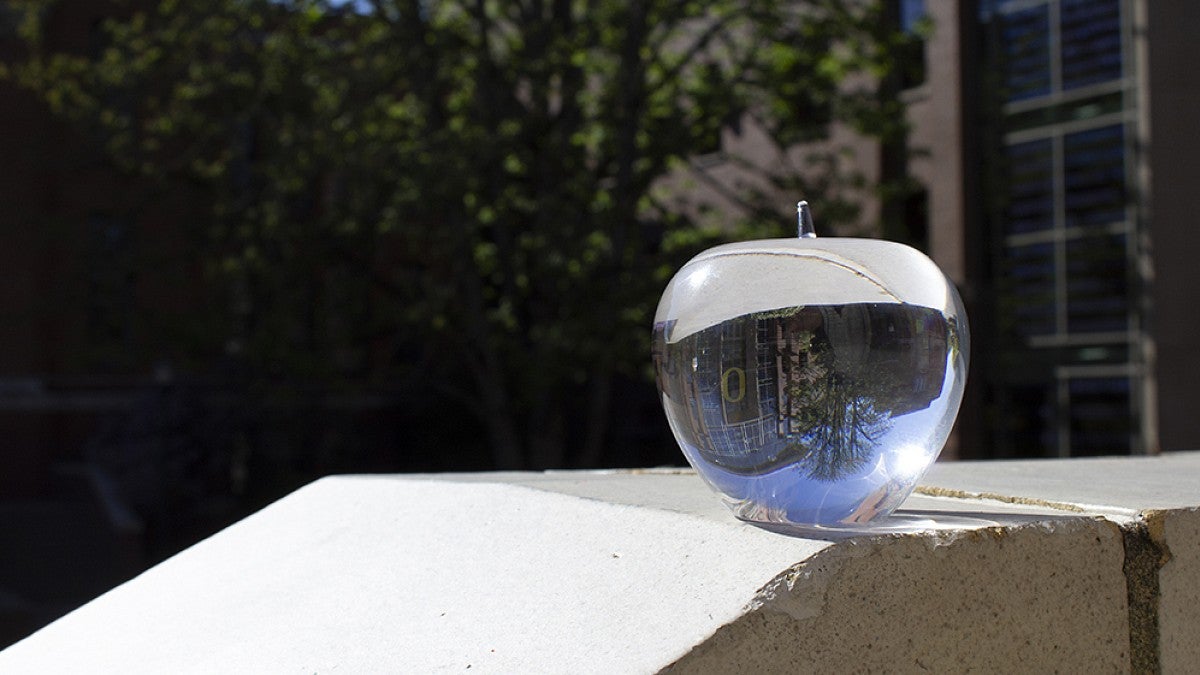If you ask Sierra Dawson, the associate vice provost for academic affairs, about teaching excellence at UO, she’ll tell you that the shift to remote teaching because of the pandemic is evidence enough that faculty members here go above and beyond for their students.
Dawson recently announced the winners of the UO’s prestigious Distinguished Teaching Awards, handed out every spring to faculty members who are nominated by the campus community based on their demonstration of exceptional teaching that is inclusive, engaged and research-led.
“There is no better time to celebrate and recognize our most outstanding teachers for their inclusive, engaged and research-informed pedagogy,” Dawson said. “The whole campus has come together and demonstrated our astonishing collective agility to pivot to novel teaching modalities while keeping our student’s education at the center of our focus.”
Traditionally, award recipients are surprised with a hand-delivered apple made of crystal or myrtlewood. This year, the seven award recipients won’t be able to hold their apples until sometime in the fall, if social-distancing restrictions allow. But the appreciation of their distinction will not have to wait.
“We cannot thank you enough for the incredibly important work you do educating our students,” UO President Michael Schill and Provost and Senior Vice President Patrick Phillips said in letters sent to the seven faculty members by email last week. “Your efforts and the quality of your work are very much appreciated by your students, your faculty colleagues, and the university community.”
The five awards are made possible by A.J. Ersted and Thomas F. Herman. The Ersted Award for Distinguished Teaching honors faculty members who have demonstrated excellence early in their career. Winners must be in their third, fourth, fifth or sixth year of teaching.
This year’s winner is Annie Zemper, a professor in the Department of Biology who considers her role to be part researcher, part teacher and mentor, and part science communicator.
The Ersted Award for Specialized Pedagogy recognizes exceptional teaching in a specific area of instruction. Maile Hutterer in the Department of the History of Art and Architecture is this year’s recipient. She said that receiving this award is one of the highlights of her career.
“Teaching is the part of my job that has the most immediate impact on the greatest number of people,” Hutterer said. “In a way, it is in teaching where I see the mission of the public research institution come to its most robust manifestation. This award validates the aspect of my job that has the furthest reach.”
The Herman Faculty Achievement Award for Distinguished Teaching recognizes faculty members who are in at least their seventh year of teaching and have shown consistent teaching talent and a contribution to learning over the course of their career. This year, the award goes to Michael Hames-Garcia in the Department of Indigenous, Race and Ethnic Studies.
“I study and teach about race and the criminal justice system: cops, courts and corrections,” Hames-Garcia said. “I am interested in why problems with racial inequity exist in the criminal justice system, what solutions exist, and how attempts at reform have and continue to bring about new problems in need of new solutions.”
Three faculty members received the Herman Award for Specialized Pedagogy, which honors senior career faculty members who have demonstrated excellence in a specific area of instruction. They are Habib Iddrisu, School of Music and Dance; Judith Raiskin, Department of Women’s, Gender, and Sexuality Studies; and Alison Gash in the Department of Political Science.
Online and remote learning is arguably more important now than ever before, and faculty members skilled in online instruction are recognized with the Herman Award for Outstanding Online Education. Erik Ford in the Lundquist College of Business is this year’s recipient, and he has spent years developing online course material.
“Winning this award is a validation of my passion for my life’s work over the last six years, creating online courses for the Lundquist College of Business,” Ford said. “It's a reinforcement of something that I already know: that I have a great job and a career that I wake up every day excited and inspired to jump in and do better.”
—By Caitlin Howard, University Communications


